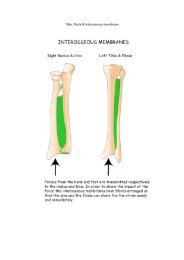GSM 11.11 version 6.2.0 - TTFN Smart card pages
GSM 11.11 version 6.2.0 - TTFN Smart card pages
GSM 11.11 version 6.2.0 - TTFN Smart card pages
- No tags were found...
Create successful ePaper yourself
Turn your PDF publications into a flip-book with our unique Google optimized e-Paper software.
(<strong>GSM</strong> <strong>11.11</strong> <strong>version</strong> <strong>6.2.0</strong> Release 1997)105TS 100 977 V<strong>6.2.0</strong> (1999-05)Annex B (normative):Coding of Alpha fields in the SIM for UCS2If 16 bit UCS2 characters as defined in ISO/IEC 10646 [31] are being used in an alpha field, the coding can take one ofthree forms. If the ME supports UCS2 coding of alpha fields in the SIM, the ME shall support all three coding schemesfor character sets containing 128 characters or less; for character sets containing more than 128 characters, the ME shallat least support the first coding scheme. If the alpha field record contains <strong>GSM</strong> default alphabet characters only, thennone of these schemes shall be used in that record. Within a record, only one coding scheme, either <strong>GSM</strong> defaultalphabet, or one of the three described below, shall be used.1) If the first octet in the alpha string is '80', then the remaining octets are 16 bit UCS2 characters, with the moresignificant octet (MSO) of the UCS2 character coded in the lower numbered octet of the alpha field, and the lesssignificant octet (LSO) of the UCS2 character is coded in the higher numbered alpha field octet, i.e. octet 2 of thealpha field contains the more significant octet (MSO) of the first UCS2 character, and octet 3 of the alpha fieldcontains the less significant octet (LSO) of the first UCS2 character (as shown below). Unused octets shall be setto 'FF', and if the alpha field is an even number of octets in length, then the last (unusable) octet shall be set to'FF'.Example 1Octet 1 Octet 2 Octet 3 Octet 4 Octet 5 Octet 6 Octet 7 Octet 8 Octet 9'80' Ch1 MSO Ch1 LSO Ch2 MSO Ch2 LSO Ch3 MSO Ch3 LSO 'FF' 'FF'2) If the first octet of the alpha string is set to '81', then the second octet contains a value indicating the number ofcharacters in the string, and the third octet contains an 8 bit number which defines bits 15 to 8 of a 16 bit basepointer, where bit 16 is set to zero, and bits 7 to 1 are also set to zero. These sixteen bits constitute a base pointerto a "half-page" in the UCS2 code space, to be used with some or all of the remaining octets in the string. Thefourth and subsequent octets in the string contain codings as follows; if bit 8 of the octet is set to zero, theremaining 7 bits of the octet contain a <strong>GSM</strong> Default Alphabet character, whereas if bit 8 of the octet is set to one,then the remaining seven bits are an offset value added to the 16 bit base pointer defined earlier, and the resultant16 bit value is a UCS2 code point, and completely defines a UCS2 character.Example 2Octet 1 Octet 2 Octet 3 Octet 4 Octet 5 Octet 6 Octet 7 Octet 8 Octet 9'81' '05' '13' '53' '95' 'A6' 'XX' 'FF' 'FF'In the above example;- Octet 2 indicates there 5 characters in the string- Octet 3 indicates bits 15 to 8 of the base pointer, and indicates a bit pattern of 0hhh hhhh h000 0000 as the 16bit base pointer number. Bengali characters for example start at code position 0980 (0000 1001 1000 0000),which is indicated by the coding '13' in octet 3 (shown by the italicised digits).- Octet 4 indicates <strong>GSM</strong> Default Alphabet character '53', i.e. "S".- Octet 5 indicates a UCS2 character offset to the base pointer of '15', expressed in binary as follows 001 0101,which, when added to the base pointer value results in a sixteen bit value of 0000 1001 1001 0101, i.e. '0995',which is the Bengali letter KA.Octet 8 contains the value 'FF', but as the string length is 5, this a valid character in the string, where the bitpattern 111 1111 is added to the base pointer, yielding a sixteen bit value of 0000 1001 1111 1111 for theUCS2 character (i.e. '09FF').ETSI








